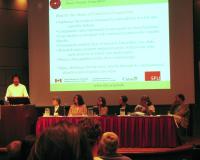Thanks to IPinCH Co-investigator Alison Wylie, the public panel discussion “Constructive Engagement: Scientific and Aboriginal Communities in Collaboration” brought together speakers in the fields of archaeology, health, and agriculture at Simon Fraser University’s downtown campus on June 18, 2010. This IPinCH event was part of “Objectivity in Science,” a four-day conference sponsored by the Social Sciences and Humanities Research Council of Canada (SSHRC), with additional support coming from SFU Dean of Arts and Social Sciences Leslie Cormack.
George Nicholas first outlined the IPinCH project’s approach to collaborative research, then Albert (Sonny) McHalsie and David Shaepe from IPinCH partner organization, the Stó:lo Research and Resource Management Centre, discussed a range of interactions between academic researchers and Stó:lo. Doris Cook, of the Family and Community Medicine department at the University of Arizona, described successes of her home community, Akwasasne, in meeting health research challenges through collaboration, and becoming more comfortable in directing some areas of research. She also described the crafting of the Canadian Institutes of Health Research (CIHR) guidelines for Aboriginal research, stressing the crucial collaboration between CIHR, the Aboriginal community, the Aboriginal Ethics Working Group, and Alberta’s ACADRE Network, with its practical experience in ethics application processes. Laura Arbour, from UBC’s Medical Genetics department, presented cases involving researchers who returned Indigenous groups’ genetic material because it was being used for purposes outside of the groups’ consents. Finally, Louise Fortmann, of the Department of Environmental Science, Policy and Management at University of California Berkeley, tied the talks together, introducing the concept of “interdependent science,” made by collaboration of conventional scientists and “civil scientists,” who have little academic training and develop local techniques useful in addressing on-the-ground needs, such as breeding plants for improved food production.






